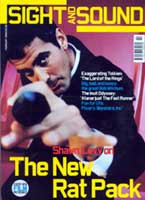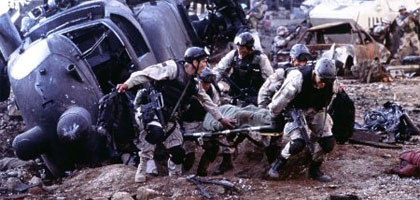
Black Hawk Down
USA 2001

Reviewed by Philip Strick
Synopsis
Our synopses give away the plot in full, including surprise twists.
Following a catastrophic famine in Somalia in 1992, attempts by the United Nations to restore order are constantly thwarted by 'warlord' Mohamed Farrah Aidid. The presence of an American regiment supposedly to maintain stability only heightens the tension. On 3 October 1993, following an attack by Aidid's men on a Red Cross distribution centre, a task force assembled at the US base on the airport outside the Somalian capital Mogadishu sets out to seize two of Aidid's lieutenants from a building in the city. Involving 19 aircraft, 12 vehicles and some 160 men, the action is expected to take about an hour.
Supervised by Major General Garrison (Sam Shepard) from the American base's JointOperations Center with its numerous surveillance screens, four teams of US Rangers, dropped by helicopter, surround the target building while men of the elite Delta commando unit successfully apprehend its occupants. But the Somalis, encouraged by Aidid's militia, are heavily armed and spoiling for a fight. The Americans find themselves outnumbered as they try to leave the city in armoured vehicles strafed with gunfire and blocked by barricades. A rocket-propelled grenade brings down Black Hawk helicopter Super Six One, and the crash survivors are exposed to ferocious attack.
Watching on his surveillance monitors, Garrison orders all available personnel to move to the crash site, but his troops, disorientated and under fire from all sides, make only slow progress. Amid the confusion a second helicopter, Super Six Four, is brought down beyond hope of immediate rescue. It is quickly over-run by the Somali hordes, its defenders killed, and its wounded pilot, Durant (Ron Eldard), taken hostage.
At the first crash site, night closes in on the besieged troopers, wounded and demoralised, fearful that dawn will bring the final attack. A massive rescue convoy, hurriedly assembled at the American base camp, arrives just in time to keep the Somalis at bay with the aid of Night Observation Devices and helicopter firepower. In the morning light, the American survivors run from a jubilant city. Nineteen soldiers have been killed, more than 70 badly injured. The Somali death toll is over a thousand.
Review
Ridley Scott's latest gladiators are based on the original participants in what has become variously known as the Battle of Mogadishu, the Battle of the Black Sea, or (by the Somalis) the Day of the Rangers. Documented by journalist Mark Bowden, who collated interviews with survivors from both sides into one chillingly readable book, this brief but emblematic disaster (where elite US troops were ferociously attacked by Mogadishu residents during a mission in the city) seems inarguably to have taken the course Bowden describes in daunting detail, accurate to every mistaken manoeuvre and every fatality. Credited now as consultant to the film of Black Hawk Down, Bowden appears as the guarantor of a horrendous authenticity.
Where Bowden painstakingly substantiates, however, the film is inclined either to simplify or to omit altogether, despite a profusion of explanatory titles before and after. Although few of the personnel have been changed, a character with the curiously Dickensian name of Grimes (played by Ewan McGregor) has been introduced to amalgamate several of the lesser Rangers. Since he is soon nearly indistinguishable from his companions under their masks of dust and blood, there is little risk of his assuming a particular heroic emphasis.
Even so, minor touches of individualism - such as the Ranger who complains at length when deafened by gunfire - go some way towards sorting out who has got to where in the confusion of the day. Both Bowden and Scott have the problem of clarifying the progress of several simultaneous battles in a city of identical street corners. Bowden's solution is to deploy some helpful maps and a copious index, but for Scott the appropriate information is too often drowned out in a tide of noisy carnage. Bowden is able partially to clarify the differences between the various American contingents which account for crucial failures in communication and uncertainties of leadership. The film simply unifies them as victims to a collective mismanagement.
Most damagingly, there is little in Black Hawk Down to explain the ferocity of the Somalis who are ready in overwhelming numbers, fully armed, as the hated Rangers begin to terrorise the centre of Mogadishu. Bowden provides a vital perspective: the city's main warlord, Mohamed Farrah Aidid, a leader of the Habr Gidir clan, believed that the United Nations was planning to restore to power a despised rival clan, the Darod. He accordingly declared war on both the UN and the US in July 1993. There had already been several helicopter attacks on the streets of Mogadishu, where a hundred Somalis were killed by Black Hawk gunfire only a few weeks previously.
Where Bowden is prepared to lend an ear to the Somali version of the hostilities, Black Hawk Down reduces the 'Sammies' to indiscriminate zealots, driven by inexplicable (but probably criminal and drug-related) fury, a faceless and expendable army against which the high-spirited but courageous troopers (not in this instance from a starship, but the purpose is much the same) can demonstrate, at an average age of 19, their allegiance to the customary military aphorisms. In Scott's defence, it could be argued that his luckless soldiers need to have no background knowledge of their enemy, and that his omission of scenes showing the care given to the captured pilot is fairly balanced by his omission of the notorious display of American corpses by their jeering killers.
What he has created, with immense technical skill and spectacular photography (by Kieslowski's cameraman Slawomir Idziak), is a biased historical reconstruction of extreme physical peril, complete with gruesome imagery (a severed artery or two), ironic detail (a donkey wanders through the battle-scarred streets), and a string of clichés ('Tell my parents I fought well today') that could have been derived as easily from Joe Dante's parodic Small Soldiers or Rod Lurie's pompous The Last Castle. Rather as if Band of Brothers were to be remade by the other Scott, Tony, Black Hawk Down is seething with a suspiciously gleeful energy, only slightly redeemed by an end title confirming that Somalia has again become subject to American scrutiny. One might guess that rather fewer infantrymen will volunteer for any further visits to Mogadishu.
Credits
- Director
- Ridley Scott
- Producers
- Jerry Bruckheimer
- Ridley Scott
- Screenplay
- Ken Nolan
- Based on the book by
- Mark Bowden
- Based on the series of articles originally published in
- The Philadelphia Inquirer
- Director of Photography
- Slawomir Idziak
- Editor
- Pietro Scalia
- Production Designer
- Arthur Max
- Music
- Hans Zimmer
